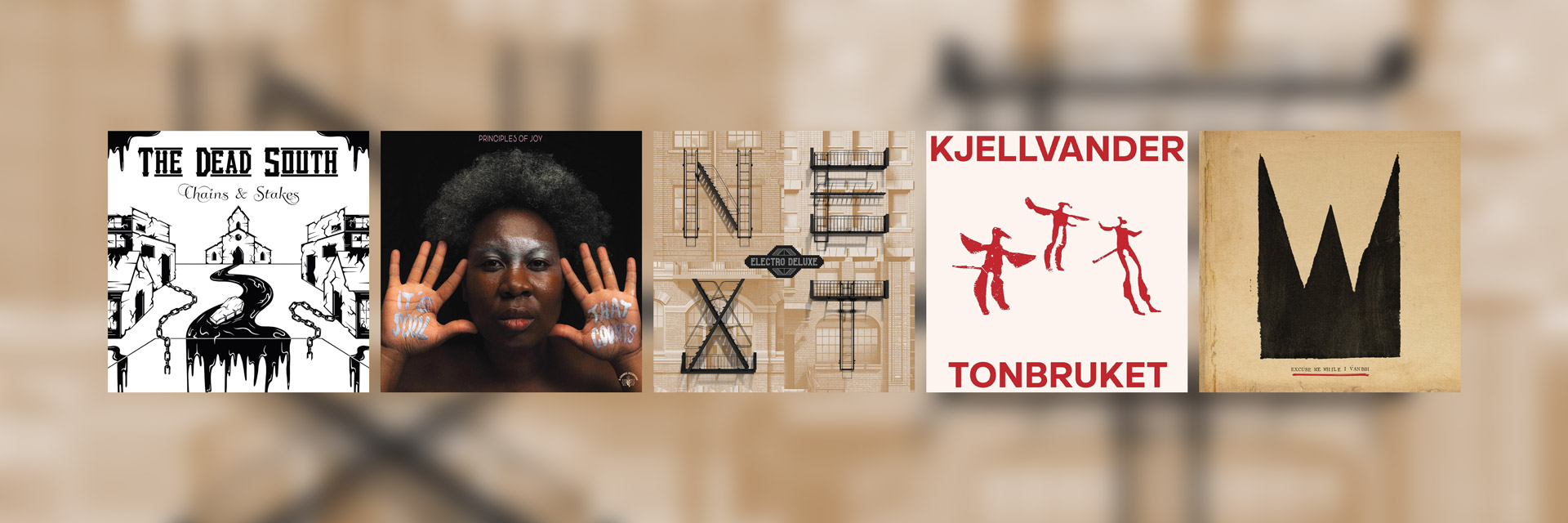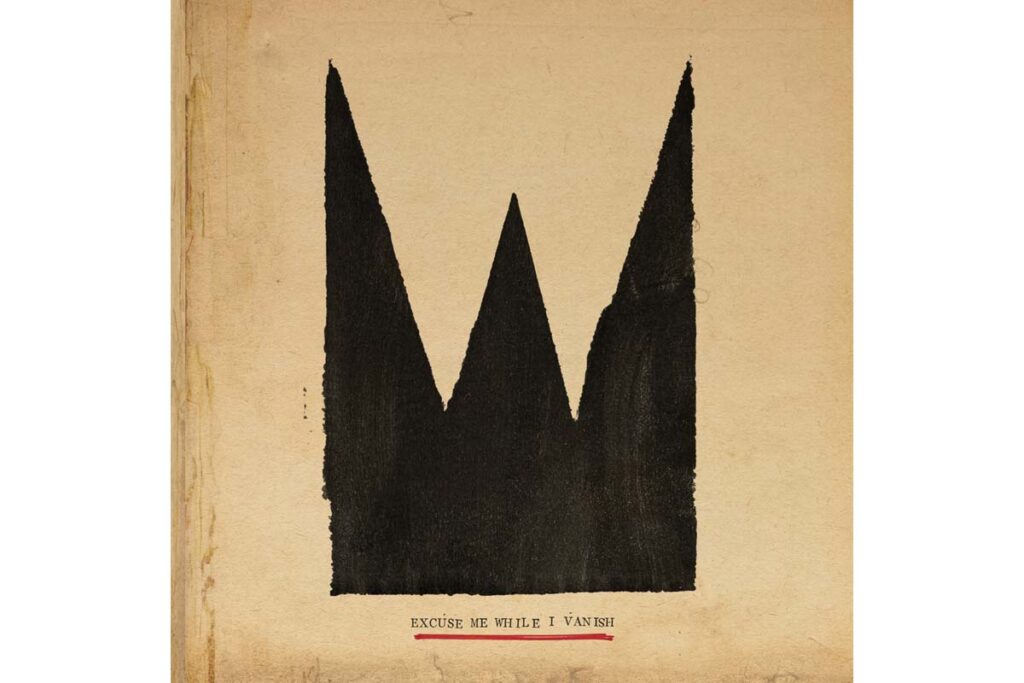The professor reactivates his fragmentary French for topical reasons – then proceeds to crank it up to pleine puissance with new works by William The Conqueror, Principles of Joy, Electro Deluxe, The Dead South and Kjellvandertonbruket.
What very few people know, and really don’t need to know, because it’s the least important episode in the evolution of the human mind: Professor P. once studied history for a semester. A nonsensical semester, during which I also had to take the “French for historians” seminar. A dubious language course, as we history students were only taught the third person singular and plural of verbs in order to be able to decipher sources in French at the end, which generally only contain these verb forms. I don’t remember anything from those distant days, apart from a few dates from the first half of the First Punic War about which I had the honor to shake a half-baked term paper out of my synapses. For those of you who are now sharpening your pens in order to elicit a few in-depth comments on the conflict between Rome and Carthage via a letter to the editor, possibly because a) you are planning to travel to Sicily this summer and would like to learn a little historical background knowledge from a competent source, or b) just want to indignantly complain that the Battle of Tynes (255 BC) has very little to do with either soul or funk music, my answer to a) is: please don’t, and to b): be patient. Because in preparation for the following advanced seminar “Popular music seen through the professor’s eyes “*, you need to hear this from your own lips: William the Conqueror, before he died of an infection in 1087, left quite a lasting impression not only in Normandy, where he came from, but also in England, which he conquered in a coup d’état coming from northern France. An exciting chapter in the history of international invasions and coups, in which illustrious names such as Godwin of Wessex, Edward the Confessor and Trostig of Northumbria play a role. In 1066, the former Norman progenitor had himself crowned King of England in Westminster Abbey Cathedral. This meant – ha-ha-ha, or hé-hé-hé – that the English nobility had to speak French from then on, in all available verb forms. Today, not much remains of William the Conqueror. His tombstone is still there, but it is disputed whether it is genuine. The same applies to the last surviving thigh bone of the former King of England. So, now I think we are well prepared for the first disc inspection. Please stay in the line. Or of course: Restez en ligne, s’il vous plaît.
* If you need a certificate, please contact the secretariat of the Chair of Comparative Soulshouting at the Institute for Music Review at the University of Funkistan.
William The Conqueror – Excuse Me While I Vanish
After the preceding words, we now know enough about historically significant thigh bones and the medieval disputes between Norman conquerors and English nobles who, roundabout or à peu près a thousand years ago, were only served French frog legs instead of home-made shepherd’s pie. But I think a little cultural background can’t hurt when we’re discussing the British band William The Conqueror, if only so that you, my dear audio academics, can shine with well-founded bullshit at the next preamplifier or power amplifier round table. I would also like to point out that with the following lines I am keeping a promise that I made here a few months ago: to take a closer look at the work of William The Conqueror after my streaming algorithm blew the song “Moving On” by the previously unknown to me English band from Rosamunde Pilcher’s Cornwall into my headphones on an endless journey on the Choo Choo Train that the German rail company calls “Express”.
The accompanying record Maverick Thinker became one of the Professor’s most exciting discoveries in recent years, and now the current work Excuse Me While I Vanish has been out in the wild for a year – and I, pants down, had missed it … But that shouldn’t bother us any further. The work of this trio around the charmingly fuzzy-bearded singer-guitarist-songwriter Ruarri Joseph, along with his shy bassist and narrow-chested drummer, is always worthy of praise, regardless of time and space. This fourth album combines indie rock, blues, pop and a good deal of grunge drumming in another magical mix. The work was recorded in the Marshall Studios, which are located right next to the amplifier factory of the well-known British manufacturer in the industrial town of Milton Keynes in central England: with lots of vintage shit in terms of analog recording technology, as the perfectly polished Brit would say. Self-produced in a retro ambience, mixed by Barny Barnicoll (Arctic Monkeys, Stereophonics, Skinny Lister), all the songs on the album celebrate an exuberant indie-pop-soul party in the professor’s mental attic – see if you’ll feel the same way. Recommended tracks: “The Puppet And The Puppeteer” (mighty grooving opening track, Ruarri Joseph’s soft baritone singing/narrative voice lets a piece of soul unfold here, which combines with elements of Southern Rock, Britpop and Americanafolk – impressively versatile for a trio line-up), “Shots Fired From Heaven” (sluggish psychedelic blues ballad opus with well-placed punk-grunge punchlines) and “The Tether” (relaxed, quiet grooving like JJ Cale, plus a gentle melody that shows: Good songwriters are at work here).
Label: Chrysalis Records/Cargo
Format: CD, LP, DL 24/48
Principles of Joy – It’s Soul That Counts
Comme par hasard, nous sommes aujourd’hui étonnamment francophiles dans la “Rhythm and Soul Revue” du professeur. Oh, excusez mon français! I accidentally slipped into Marseillaise mode. What I mean to say is that we are astonishingly Francophile today, friends, and not just in the third person … This is due to the fact that just under a thousand years after William the Conqueror, another appropriation of French culture took place, namely when Afro-Anglo-Saxon soul spilled over the Grand Etang and positioned itself either as Northern Soul or a cool Franco variant to the filterless chanson murmur of French “Heure Bleue” traditionalists. And conversely, during the Franco-British War in the 18th century, “Qui” sayers infiltrated the blues with fiddle and accordion as they fled from the north (Acadia in present-day Canada) to the south (Louisiana) and still celebrate exuberant Cajun parties today, at which the motto is: Laissez les bons temps rouler, which means something like: Let it rip! That’s what we’re allowed to do today. Anyway, I would like to introduce you to a band from the greater Paris area who have realized just that: It’s soul that counts. And that’s also the title of Principles of Joy’s third album. It’s a colorful album – according to the enclosed info slip – yes, paper is not quite dead yet – there are borrowings from “Northern Soul of the 60s”, “Midtempo Soul of the 70s”, contemporary “Dance Soul”, politically charged “Blaxploitation Soul”, plus “Shaolin Soul” and “Psyche Soul”, although I suspect that someone made up the last two genres when formulating the handout. Creativity counts, especially as the album is said to borrow from “feminist funk” and “acid folk”. Well … I suggest: You can decide for yourself which pidgeonholes seem most fitting. You can also just listen to me. I recommend these tips: “Girls Be Like” (disco-soul in the style of Chic, with a driving bass and definitely danceable), “No Justice No Peace Pt1 & Pt 2” (political manifesto in the arrangement of a ten-minute voodoo-soul opus) and “Your Thing Is A Drag” (the album’s only cover song, borrowed from Sharon Jones, with a clavinet taking over the power points that would otherwise be the responsibility of a horn section).
Label: Q-Sounds Recording
Format: CD, LP, DL 24/44
Electro Deluxe – Next
In order to save travel costs or simply to avoid spending the night on the platform because the TGV crews are on strike, which has now become the status quo in Central European railroad employee circles – yes, Deutsche Bahn union, I’m also looking at you – so – phew, this sentence has lots of insertions, but we have to get through it now – let’s just stay in Paris. There, in the early 2000s, a Hammond organ player, a drummer and a saxophonist decided to mix fusion jazz with electro beats and, above all, a lot of funk and soul, turn up the volume and record crisp records as Electro Deluxe. As a septet, they began with nu jazz, commonly referred to as fusion fiddling, but then fortunately discovered funk. Singer James Copley, a mixture of George Clooney and good-humored Stefan Gwildis, sings with amazingly dirty soul pipes despite his hipster beard and headhunter suit. I already introduced you to one record, Full Circle, six years ago or so, and in the professor’s never-ending review tour I would also like to say a few words about the current one, Next, and find it again at the same time: Even better than the previously mentioned. With the participation of Candy Dulfer (once Prince soloist), Nils Landgren (founder of the band Funk Unit and Sweden’s answer to trombone funk father Fred Wesley) and Fred Wesley himself (former musical director of James Brown and once one third of the J.B. Horns alongside Maceo Parker and Pee Wee Ellis), an extremely powerful work has been created. An album whose tracks appear smothered in warm orange tones and create a somehow soothing seventies funk flair – with the occasional neon effects of Prince’s pop-punk punchlines. A dominant, deep pumping bass, booming brass broadsides, drums driving nervously in a demanding second line rhythm – Next makes the professor want to finish this text and dance a few steps.
Label: Stardown
Format: CD, LP, DL 24/44
The Dead South – Chains & Stakes
A small package reached the Professor from the vastness of the Canadian prairie. A dusty messenger of the Pony Express, the traditional North American mail delivery service with 1 horsepower, tossed it my way after he had double-parked his little horse, then got a parking ticket handed with no delay – that’s a residential parking zone for you … To be more precise, the package came from the western Canadian province of Saskatchewan. And since I enjoy sending you non-binding greetings from the research business unit of Prof. P.’s Rhythm and Soul Revue: Saskatchewan is not only home to the neo-bluegrass band The Dead South, to be considered in a moment, but was also once home to Leslie Nielsen, to whom I owe many a laugh as a teenager, courtesy of Airplane! and, of course, The Naked Gun, which, by the way, is currently being remade into a movie with Liam Neesen. Well, now we got sidetracked, so let’s get back on track: The Dead South have been playing, as they themselves say, “rockin’ stompin’ bluegrass” since their debut from ten years ago, Good Company. So far, the quartet hadn’t crossed my path, so I’m all the more amazed that The Dead South play in front of full sports halls with Appalachian folk music, four-part harmony vocals and no rhythm section – they play acoustic guitar, banjo, mandolin and bass cello (!). This fourth album – which recently spent a week in the German charts at number 74 on its release – marks my entry into this rather unusual world, and I invite you to accompany me. The way folk, country, soul and rock’n’roll, lightning-fast banjo solos and madolin madness are shaken and stirred together into a magical mixture here, along with Nathaniel Hilts’ raspy, soulful voice – friends, it’s a leg-raiser. 13 short songs make up the album’s total length of just 38 minutes – it never gets boring. I’ll spare you any tips on what to play this time, you just have to listen to the entire thing in one go. Let’s roll!
Label: DevilDuck Records
Format: CD, LP, DL 24/96
Kjellvandertonbruket – Fossils
As you may know, Bob Dylan has been constantly moving around the globe in an ever winding “Never Ending Tour” since 1988. The Professor does a similar thing, following the inner nomadic call of his Never Ending Rhythm and Soul Revue. And as it goes on a journey with the final destination Nirvana, you tend to bump into one another twice or thrice or more along the way. Attentive readers will therefore notice that this is the second time I have devoted myself to the work of Kjellvandertonbruket. For those to whom this name doesn’t ring a bell: The band is made up of Swedish songwriter Christian Kjellvander and a handful of Scandinavian jazz and independent pop legends. Kjellvander is something of an institution in the land of the moose; his solo work Wild Hxmans, for example, was nominated for the Swedish Grammis music prize in 2018. Tonbruket, on the other hand, is a community of interests around the former bassist of the Esbjörn Svensson Trio, Dan Berglund, with Martin Hederos (keyboardist of the rock band The Soundtrack Of Our Lives) as well as drummer Andreas Werliin and guitarist Johan Lindström from the Gothenburg experimental blues band Wildbirds & Peacedrums. Tonbruket, for their part, have already received four Grammis in the jazz category. This is the second time that two well-rehearsed creative units have come together for Kjellvandertonbruket’s Fossils. The debut Doom Country from 2020 already received extremely positive feedback here on these pages, and now I get to skillfully recycle my enthusiasm on the occasion of the follow-up album. Fossils was once again recorded in a single improvisation session in just four days. The result were slowly meandering magma sounds that push their way through barren soundscapes – if Sweden had a volcano, it would be called Kjellvandertonbruket. The album only has five tracks, but they are up to 16 minutes long. “September Weather”: a post-modern blues that, starting from the silence of the room, swells over the course of eight minutes into a loud cacophony with the power of a wandering terminal moraine that sounds more like November than September. Similarly, “The Last Thing (Thief)”: An apocalyptically crashing Swedish gospel emerges from a delicate guitar finger exercise accompanied by unfolding drum-bass rhythms … The professor’s advice: listen.
Label: Startracks
Format: CD, LP, DL 16/44






